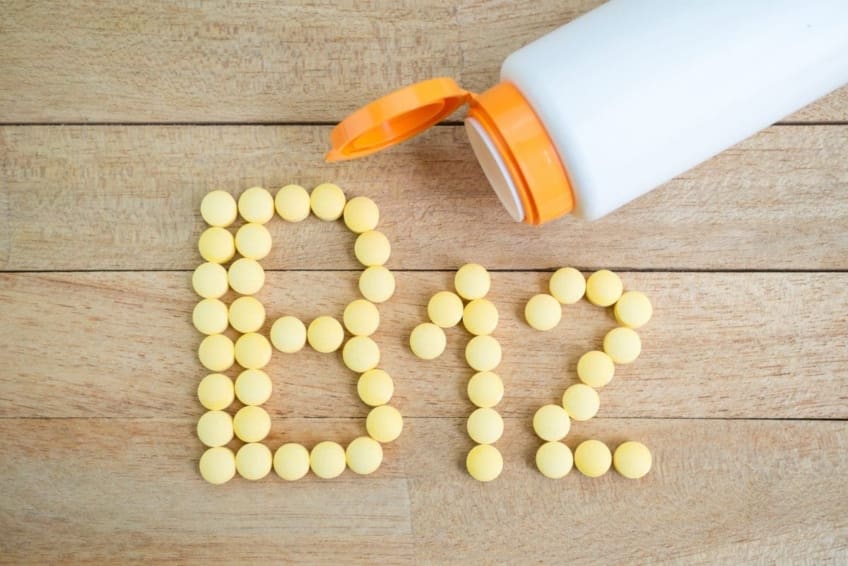
Vitamin B12 Deficiency Symptoms and Treatment
What Does Vitamin B12 Do in the Body?
Vitamin B12 is an important nutrient for your body. It helps keep your body’s nerve and blood cells healthy. It also keeps your nervous system working properly. Vitamin B12 is found naturally in some foods and is added to other fortified foods. You also can get vitamin B12 as a dietary supplement.
Talk to your doctor to make sure you’re getting enough vitamin B12.
How Much Vitamin B12 Does My Body Need?
Your body needs a certain amount of vitamin B12 to stay healthy. This amount varies by your age. Below is the daily recommended intake of vitamin B12 in micrograms (mcg).
Recommended Dietary Allowance (RDA) for Vitamin B12
| Age | RDA per day |
|---|---|
| 0 to 6 months | 0.4 mcg |
| 7 to 12 months | 0.5 mcg |
| 1 to 3 years | 0.9 mcg |
| 4 to 8 years | 1.2 mcg |
| 9 to 13 years | 1.8 mcg |
| 14 years and older | 2.4 mcg |
This amount increases if you are pregnant or nursing. You should get 2.6 mcg of vitamin B12 if you’re pregnant. You should get 2.8 mcg of B12 if you are breastfeeding.
A low level of vitamin B12 is a deficiency. Most people with low B12 levels don’t get enough from food sources. This occurs in many vegetarians and vegans. Other people may have trouble absorbing B12 in their stomachs or small intestines.
Common Symptoms of Vitamin B12 Deficiency
If your B12 level is a little low, you might not have any symptoms. A very low level can cause anemia, which is a decrease in red blood cells. Other symptoms include:
- Weakness
- Fatigue
- Tingling or numbness in the arms or legs
- Pernicious anemia
A low B12 level has also been linked to the following symptoms and disorders, including:
- Pale skin
- Fast heartbeat
- Shortness of breath
- Bloating or gas
- Constipation or diarrhea
- Loss of appetite
- Depression
- Dementia
If you have any of these symptoms, contact your doctor. They can determine the cause of your deficiency. They will perform a physical exam or review your health. A blood test may be done as well. Your doctor may want to check your homocysteine levels. This is an amino acid found in your blood. If you have low B12 and high homocysteine, you may be at risk for heart disease and stroke.
A consistently low B12 level can damage your nervous system. The damage can become permanent if left untreated.
How to Treat Vitamin B12 Deficiency
You can prevent a B12 deficiency by eating foods such as:
- Meat and poultry
- Organ meats, like liver
- Fish and shellfish
- Eggs, milk, and dairy products
- Some fortified cereals, grains, and yeasts (check the nutrition fact label for the amount of vitamin B12)
In addition to diet, you may need to take a supplement of vitamin B12. B12 is available as a prescription pill. It also comes in the form of nose spray, nasal gel, or under-the-tongue medicine. These methods work for most people. However, a small number of people may need to receive injections to raise their levels. For these people, prescription vitamin B12 shots can treat some deficiencies. You’ll get shots every 1 to 2 days for about 2 weeks. After this, you get a shot once a month.
Things to consider
Some people have a hard time absorbing vitamin B12. This problem increases for people over 50 years of age. Certain medicines used to treat heartburn, ulcers, and diabetes affect this process. The following conditions also make it hard to absorb vitamin B12.
- A digestive disorder, such as celiac or Crohn’s disease
- Previous gastrointestinal or weight loss surgery
- Abnormal bacterial growth in your stomach
- Immune system disorders, such as lupus or Graves disease
- Atrophic gastritis, which is irritation of your stomach lining
- Alcoholism
Questions to ask your doctor
- Am I getting enough vitamin B12?
- Do I need to take a supplement?
- What foods should I eat to get more vitamin B12?
- What foods can I eat that are high in vitamin B12 if I’m vegetarian or vegan?
- Can getting too much vitamin B12 be dangerous?
- What medicines interact with vitamin B12?
Resources
![]()
Copyright © American Academy of Family Physicians
This information provides a general overview and may not apply to everyone. Talk to your family doctor to find out if this information applies to you and to get more information on this subject.











